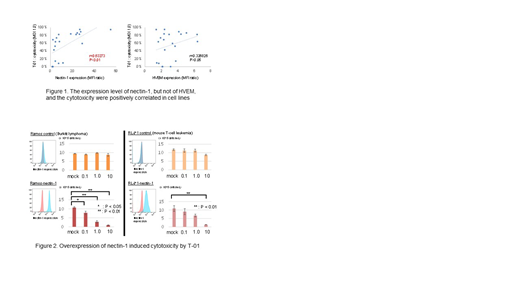Background: Oncolytic virus (OV) is an attractive and rapidly developing antitumor therapy. OVs preferentially replicate in tumor cells and exhibit a tumoricidal activity without damaging normal cells. G47Δ is a herpes simplex virus (HSV)-1 genetically engineered to enhance tumor selectivity and immunogenicity. Clinical trials of G47Δ have been conducted for brain and prostate cancers. Anecdotal reports that leukemia and lymphoma shrink following viral infection imply effectiveness of OV therapy against hematological malignancies.
Aim: We examined whether G47Δ has the potential for treatment of hematological malignancies.
Methods: T-01, an HSV-1 containing modification in the same genes as G47Δ, was used in this study. To assess T-01 infectivity and cytotoxicity for hematological tumor cells, cell lines and clinical samples were incubated with the virus. T-GFP, T-01 containing the GFP gene, was used to quantify the viral infectivity. To examine antitumor activity in vivo, we injected T-01 into subcutaneously inoculated tumors in immunodeficient SCID-Beige mice. To identify the differences between T-01-susceptible and resistant cells, we examined the involvement of HSV entry receptors (nectin-1, HVEM, PILRα, non-muscle myosin IIA and IIB) and antiviral molecules (cGAS-STING and PKR-eIF2α pathways). Jurkat and THP-1 cell lines were infected with the lentivirus vector expressing shRNA against nectin-1. Ramos and RL-male-1 (murine leukemia) cell lines were infected with the lentivirus vector expressing human nectin-1.
Results: 15 of 21 cell lines from T-, B-, and myeloid-derived hematological malignancies were infected and killed by T-01. 8 of 15 clinical samples were also killed by T-01, and all the susceptible samples were from relapsed patients. Growth of the subcutaneous GRANTA-519 and ED-40515 (ATL cell line) tumors was significantly suppressed by intratumor injection of T-01. The expression level of nectin-1, the amount of viral entry, and the cytotoxicity were positively correlated in cell lines and clinical samples (Figure 1). In agreement with this, knockdown of nectin-1 decreased the amount of viral entry, and overexpression of nectin-1 induced cytotoxicity by T-01 (Figure 2). In contrast, there was no correlation between the expression levels of the antiviral molecules and the cytotoxicity.
Conclusion: Oncolytic HSV-1 has the potential for treatment of relapsed hematological malignancies. Entry via nectin-1 is a determining factor of susceptibility to oncolytic HSV-1 for hematological malignancies. Nectin-1 may be useful as a biomarker for efficacy of G47Δ.
Takaori-Kondo:Bristol-Myers Squibb: Honoraria, Research Funding; Ono: Research Funding; Takeda: Research Funding; Kyowa Kirin: Research Funding; Chugai: Research Funding; Janssen: Honoraria; Pfizer: Honoraria; Celgene: Honoraria, Research Funding; Novartis: Honoraria. Kadowaki:Takeda Pharmaceutical Company Ltd.: Honoraria, Research Funding; Taiho Pharmaceutical Co., Ltd.: Honoraria, Research Funding; Sumitomo Dainippon Pharma Co., Ltd.: Honoraria, Research Funding; Bristol-Myers Squibb Company: Honoraria, Research Funding; Asahi Kasei Pharma Corporation: Honoraria, Research Funding; Astellas Pharma Inc.: Honoraria, Research Funding; Chugai Pharmaceutical Co., Ltd.: Honoraria, Research Funding; Daiichi Sankyo Company Ltd.: Honoraria, Research Funding; Eisai Co., Ltd.: Honoraria, Research Funding; Kyowa Kirin Co., Ltd.: Honoraria, Research Funding; Merck & Co., Inc.: Honoraria, Research Funding; Ono Pharmaceutical Co., Ltd.: Honoraria, Research Funding; Otsuka Pharmaceutical Co., Ltd.: Honoraria, Research Funding; Novartis AG: Honoraria, Research Funding; Pfizer Japan Inc.: Honoraria, Research Funding.
Author notes
Asterisk with author names denotes non-ASH members.


This feature is available to Subscribers Only
Sign In or Create an Account Close Modal